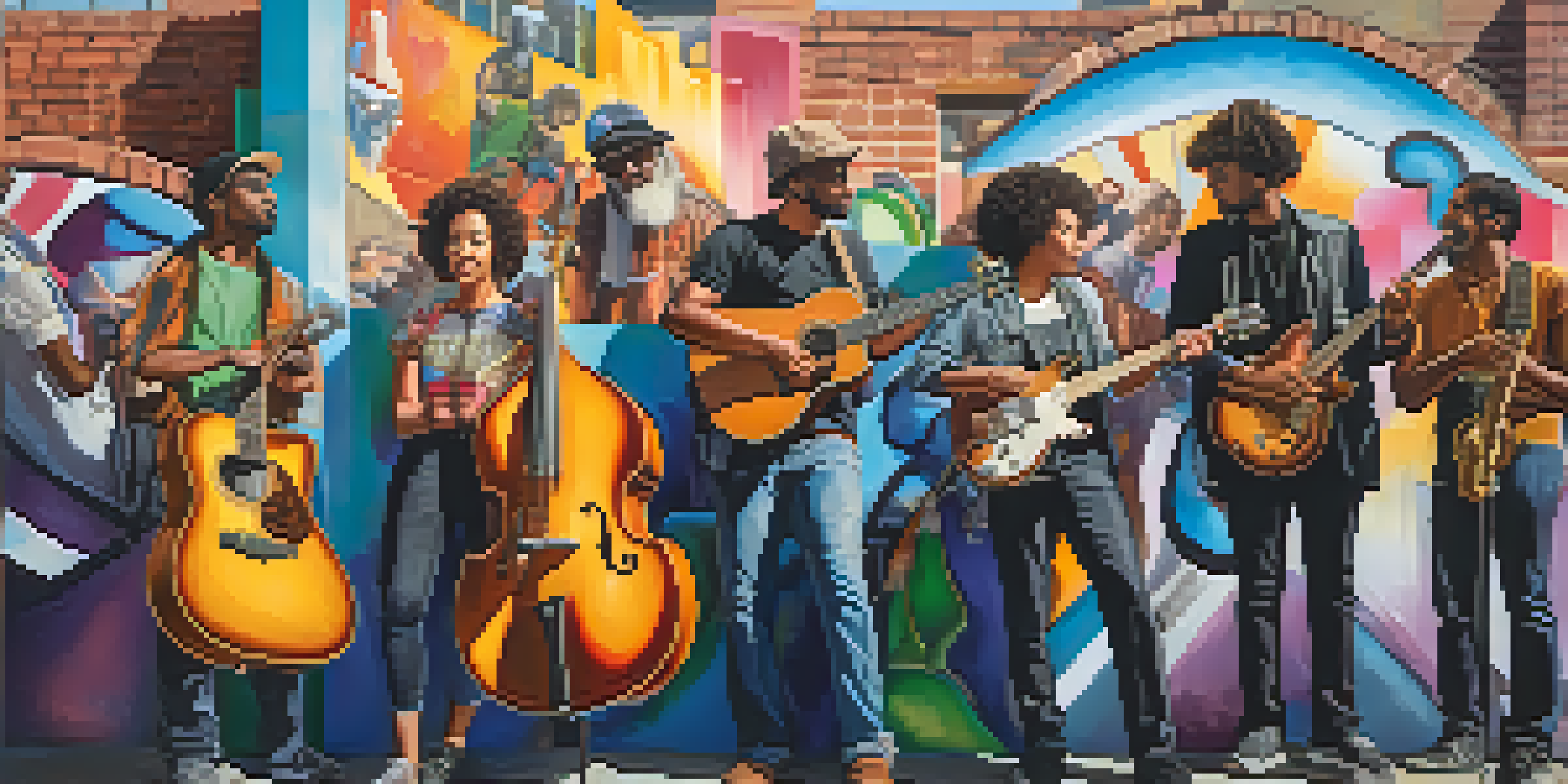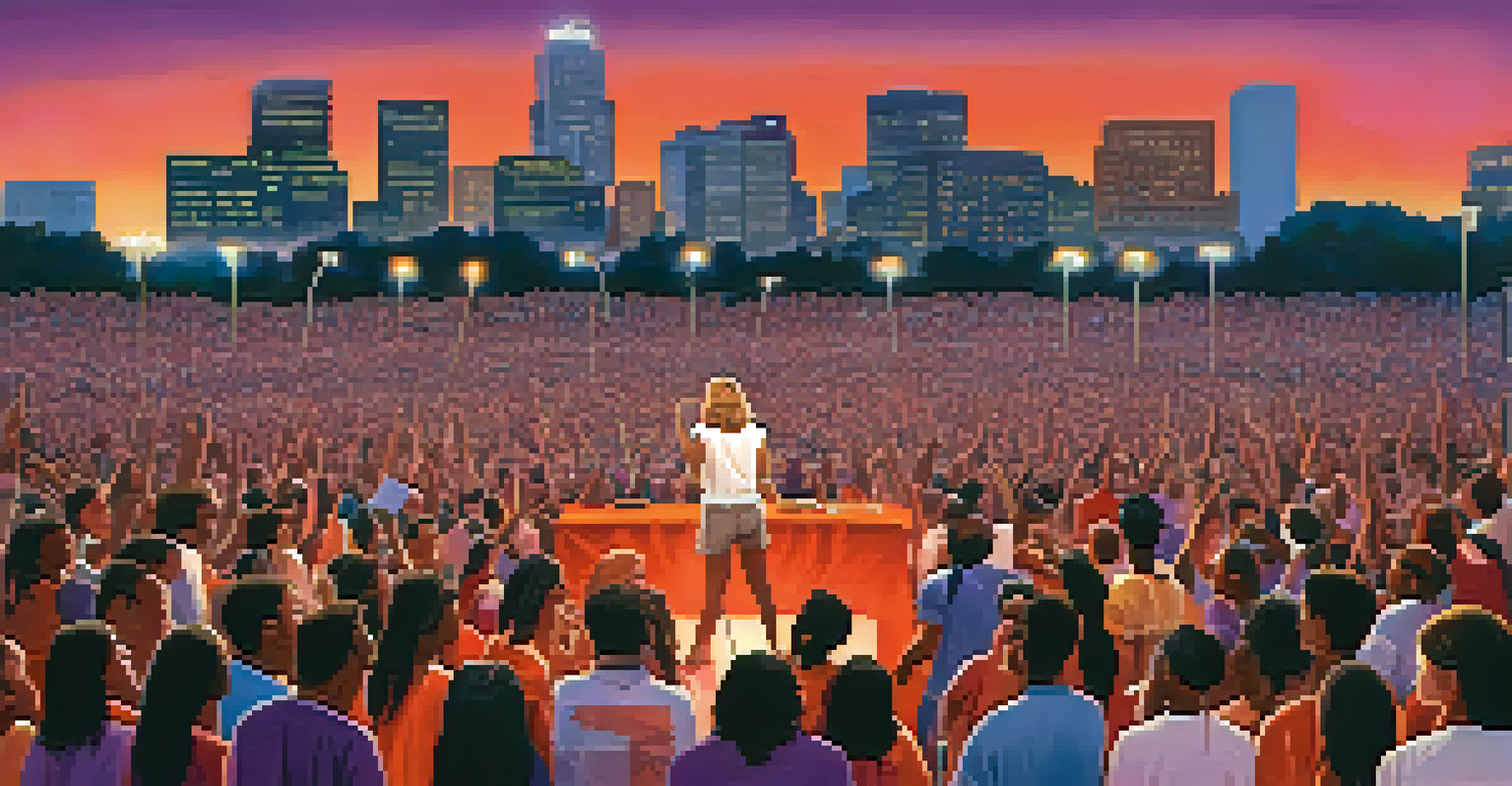Music as a Tool for Political Satire and Commentary

The Historical Roots of Political Satire in Music
Political satire through music has deep historical roots, dating back to ancient civilizations. From the satirical songs of the Roman poet Horace to the folk ballads of medieval Europe, music has always been a medium for social critique. These early forms of musical satire allowed people to voice their dissent and challenge authority in a way that was both entertaining and impactful.
Music can change the world because it can change people.
As societies advanced, so did the complexity of musical satire. The rise of genres like opera and musical theater in the 17th and 18th centuries often included sharp political commentary woven into their narratives. This evolution shows how music has adapted to reflect the political climates of different eras, making it a versatile tool for expression.
Today, this rich tradition continues, with artists using music to tackle contemporary issues. The ability to blend melody with message creates a powerful platform for political commentary that resonates with audiences across generations.
How Music Engages Audiences in Political Discourse
Music has a unique way of engaging audiences, creating an emotional connection that text or speech alone often cannot achieve. When people listen to a song, they may feel a sense of solidarity with the artist's message, making political issues more relatable. This emotional engagement can motivate listeners to think critically about the topics presented and even inspire action.

For instance, protest songs like Bob Dylan's 'The Times They Are A-Changin'' have galvanized movements by resonating with the sentiments of societal change. Such songs often serve as anthems for collective action, uniting individuals under a common cause. This shows how music can transcend mere entertainment to become a crucial part of political discourse.
Music's Historical Satire Roots
Political satire in music has a long history, serving as a means for social critique from ancient times to the modern era.
Moreover, musical genres like hip-hop and punk rock have cultivated a culture of resistance, encouraging artists to speak out against injustice. Through catchy hooks and powerful lyrics, these genres invite listeners to engage with political content in a way that feels accessible and relevant.
The Role of Satirical Lyrics in Shaping Public Opinion
Satirical lyrics have the power to shape public opinion by using humor to highlight the absurdities of political situations. Artists like 'Weird Al' Yankovic have mastered this art, turning popular songs into clever parodies that critique politicians and policies. This approach not only entertains but also prompts listeners to reflect on the issues at hand.
If you want to make a change in the world, you have to be willing to stand up and be heard.
Moreover, the use of satire can make difficult topics more approachable. By framing serious issues in a humorous light, artists can lower defenses and invite listeners to engage in discussions they might otherwise avoid. This accessibility is crucial in a world where political polarization often stifles productive conversation.
Songs like 'American Idiot' by Green Day take a more direct approach, using biting satire to address American politics post-9/11. Such works challenge listeners to confront uncomfortable truths while still providing an outlet for dissent, showing how satire can be both entertaining and enlightening.
Famous Political Satire Songs That Made an Impact
Throughout history, there have been numerous songs that have left a significant mark on political discourse. One notable example is 'Fortunate Son' by Creedence Clearwater Revival, which critiques the disparity in how different social classes are affected by war. This song became an anthem for the anti-Vietnam War movement, illustrating how powerful music can be in shaping social movements.
Another iconic example is 'Fight the Power' by Public Enemy, which addresses racial inequality and systemic oppression. The song not only sparked conversations but also encouraged a generation to rise up and demand change. Such tracks demonstrate the potential of music to influence public sentiment and mobilize communities.
Engaging Audiences Through Emotion
Music creates an emotional connection that can inspire listeners to engage with political issues and motivate action.
These songs often reflect the zeitgeist of their times, capturing the frustrations and hopes of the populace. They serve as reminders of music's ability to amplify voices that might otherwise go unheard, making them a vital part of the political landscape.
The Influence of Social Media on Political Music
In today's digital age, social media has transformed the way political music is created, shared, and consumed. Platforms like YouTube, TikTok, and Instagram allow artists to reach wider audiences with their messages, often going viral in a matter of hours. This democratization of music distribution means that previously underground artists can now gain mainstream recognition for their political commentary.
Moreover, social media encourages rapid responses to current events, enabling artists to create timely songs that resonate with ongoing issues. For example, many musicians released tracks addressing the COVID-19 pandemic, using their platforms to raise awareness and encourage solidarity. This immediacy has made music an even more powerful tool for political engagement.
However, this shift also means that political music can be subject to the whims of social media trends. While it provides a space for creativity, it also poses challenges in ensuring that the messages remain authentic and impactful amidst the noise of virality.
Challenges Faced by Artists in Political Commentary
While music can be a powerful tool for political commentary, artists often face significant challenges in expressing their views. Censorship, whether from governments or private platforms, can stifle creativity and limit the reach of politically charged music. In some regions, musicians may risk their safety when addressing controversial topics, highlighting the precarious position of artists in the political arena.
Additionally, the commercialization of music can dilute its political messages. With record labels prioritizing marketability, artists may feel pressure to tone down their political commentary to appeal to broader audiences. This tension between artistic integrity and commercial success can lead to a dilution of the very messages that made their music resonate in the first place.
Challenges in Political Expression
Artists face obstacles such as censorship and commercialization, which can hinder their ability to deliver impactful political commentary.
Despite these challenges, many artists continue to push boundaries and use their platforms to advocate for change. Their resilience often serves as an inspiration for others, proving that music remains a vital form of political expression, even in the face of adversity.
The Future of Music as Political Satire and Commentary
Looking ahead, the role of music in political satire and commentary is likely to evolve alongside societal changes. As new issues emerge and technology advances, artists will undoubtedly find innovative ways to address political themes. The rise of artificial intelligence and virtual reality, for example, may open new avenues for musical expression and engagement.
Furthermore, as younger generations become more politically active, there is potential for a resurgence of politically charged music that reflects their values and concerns. This shift could lead to a new wave of protest songs that address climate change, social justice, and other pressing issues. Artists will continue to play a crucial role in shaping the political landscape through their work.

Ultimately, the enduring power of music lies in its ability to connect people and inspire change. As long as artists remain committed to using their voices for commentary, music will continue to be a significant force in political discourse, reminding us of the impact of art on society.